#I WANTED TO MAKE A RECAP OF ALL THE PARALLELS AFTER LAST TWILIGHT ENDED BUT AT THIS RATE IT WOULD TAKE ME 60 POSTS TO GET THROUGH ALL
Explore tagged Tumblr posts
Note
Idk if you remembered but in vice versa ep 7 3/4, when they argued about the chicken and the sauce in the bus, talay asked “are we still talking about the chicken?” while in last twilight ep 7 2/4, day asked “are you still talking about the shoes?” Just wanna add that bcs no one mentioned it yet and the fact that I love reading your vv brainrot so much!!!! pls keep it coming~
NOT TO BE DRAMATIC BUT IM ABOUT TO LOSE MY GODDAMN MIND I FEEL LIKE IM EXPERIENCING BOUTS OF FEMALE HYSTERIA INSIDE A FEVER DREAM LIKE




FRIENDS?????????? HELLO???????????????
IF ONCE IS AN ACCIDENT TWICE IS A COINCIDENCE AND THREE TIMES IS A PATTERN THEN THE 936485294th PARALLEL IN THE SPAN OF SEVEN EPISODES IS P'AOF LOUNGING IN HIS APARTMENT AT 2 AM WITH A GLASS OF WINE IN ONE HAND AND A PEN IN THE OTHER WATCHING VICE VERSA ON AN 85 INCH TV JUST GIGGLING TWIRLING HIS HAIR KICKING HIS FEET AS HE JOTS DOWN WHICH SCENES COULD BOTH FIT MORKDAY'S NARRATIVE THE BEST AND MAKE NOMNOMS LOSE THEIR MIND THE MOST WHILE P'X IS UP ON VIDEO CALL WHISPERING SUGGESTIONS IN HIS EAR LIKE A DEVIL ON HIS SHOULDER
FOR LEGAL REASON THIS IS A JOKE BUT ALSO IS IT REALLY
#AND IT'S EPISODE 7 ONCE AGAIN LIKE STOOOOPPPPPPPPPPPP ✋😭#@PINKYBRAIN ARE YOU SEEING THIS!!!!!!!!!!!#I WANTED TO MAKE A RECAP OF ALL THE PARALLELS AFTER LAST TWILIGHT ENDED BUT AT THIS RATE IT WOULD TAKE ME 60 POSTS TO GET THROUGH ALL#ANYWAY THANK YOU SO MUCH FOR POINTING THIS OUT ANON IM GOING INSANE#vice versa#last twilight the series#m: ask
23 notes
·
View notes
Text
“Kingdom Hearts II” revisited, Part I
Seeing as how Kingdom Hearts II is quite a long game, with quite a bit packed into it, I figured I’d chop this retrospective up. As I go through the game, I may come back and revise certain things here, but for now, let’s just look at KH II’s extended prelude with Roxas.
A lot of people say that this section of the game is overlong; a lot of people are right. The breaking point for me was the “seven wonders” episode. Everything in that day - story content, thematic underpinning, character beats - had already been stated by that point. One could argue that these all saw minor advancement during the “seven wonders” episode, or that DiZ showing some kindness by giving Roxas a glimpse of one of the wonders while also plotting Namine’s death in the same scene was important to his character. I wouldn’t disagree on the latter point, but I think finding a moment in the Struggle tournament for DiZ to have a flicker of kindness would have allowed that scene, or one very close to it, to happen after that day, without creating the lag on the pace of the game that the “seven wonders” episode creates.
However, that is my only major complaint with the Roxas prelude. Not only does it hold up well in spite of that lag, but in some ways it’s better than I remember.
I’ve mentioned before that I didn’t know Chain of Memories existed the first time I played KH II, and I thought it was one of the most impressive and daring feats of narrative I’d seen pulled in a series using such high-profile, mainstream characters. So many series have time jumps between entries - some of them longer than the year between KH I and II - without any major changes in the characters. Now, here was this E10-rated video game from Disney with an entire untold chapter that lands its hero in hibernation, his magical weapon in the hands of a total stranger! It blew my mind that they would do that, almost as much as it blew my mind that they’d end the first game on such a bittersweet note!
Of course, CoM does exist, and I can’t go back to a time where I didn’t know that. But I think that, if I’d somehow stayed ignorant of CoM all these years, I’d still ultimately applaud KH II, both for the idea of starting in such a different place from the end of KH I (when they had to at least suspect that a lot of players wouldn’t have caught the GBA title), and for the execution of that idea. And the key to the execution is that, ultimately, the player is given enough information to figure out the essentials of what happened to Sora without needing to know everything. That is - within that Roxas prelude, you see and learn enough to figure out that, at some point after KH I, Sora ended up in a conflict that cost him his memories, that a witch named Namine has power over his memories and has been working to restore them to Sora while he sleeps, and that this boy Roxas is somehow connected or derived from Sora and must reunite with him in order for Sora to be whole again. You can also safely deduce that the “Ansem” working with this character DiZ isn’t Ansem, Seeker of Darkness as you know him from KH I. If you really thought about it, you could probably figure out that it’s Riku, but going just on what the prelude shows you, that’s a bit more of a stretch.
If memory serves me well, this is the case throughout KH II. The events of CoM, and the (then) untold story about Roxas and Organization XIII, are revealed piecemeal over the course of the game, never in full, but just enough to make the story and character relationships work within this story. This is the way to have mystery in your plot and an open-ended quality to your world lore without it becoming needlessly confusing or detracting from the actual story.
If you had played CoM and Reverse/Rebirth, the deduction about Riku would be much easier to make, and Namine’s reappearance would be much more meaningful. I think her reappearance is handled very well, establishing her as in league with DiZ and “Ansem” in some way but possessed of more independent agency than she showed in CoM. Her ties to Kairi are also nicely reintroduced, as is Kairi herself. She’s the best character to choose IMO for showing how the events of the past year have affected the memories of Sora in the worlds, and how they’re being restored. And since Kairi is the one member of our original character trio of protagonists who hasn’t gone through extreme changes between games, this is a great way to get her involved in the story again. How all these things tie into Roxas’s connection to Sora, while allowing for a recap of the events of KH I for those who needed it, is very well-handled. Though I must admit - I didn’t remember that the Xemnas battle in Hollow Bastion from Final Mix being thrown into the flashbacks. If, like me, you’ve stuck to the vanilla versions of these games, that could be pretty confusing.
DiZ and “Ansem” make for an intriguing odd couple in this prelude. It was wonderful to hear Christopher Lee’s voice behind DiZ again. Why he wasn’t brought back for R/R, and why they redubbed his 358/2 Days material, I will never know. I can’t say much more about them now, because I can’t remember much more without having played more of the game XD
As far as Twilight Town and the people within it go - this is one area where the game is definitely better than I remember, because I really couldn’t recall much about Hayner, Pence, and Olette. Their material in KH III was so dull that, after playing that game, I wondered if they’d always been that way, and that’s why I didn’t remember them. But they’re actually a pretty good trio, with nice echoes of the Destiny Islands characters without feeling too derivative of them the way some later groups will. Olette, admittedly, isn’t all that fleshed out as a character, but Hayner is (Pence is somewhere in the middle). The parallels with Riku are fairly obvious - the self-appointed leader status, the petty jealousy over friends hanging out with others - but he shows maturity that that character didn’t, in his quiet acceptance of the passage of time drifting some friends apart. His dynamic with Roxas is very good - much more so, I have to say, than anything I’ve ever seen between Roxas and Axel.
I don’t have a whole lot to say about Roxas just now - partly because I want to play more of the game, and partly because I have some fairly unpopular ideas about Roxas I’m saving for a later post. But for now, I do want to push back on a critique of this prelude that I’ve seen tossed around: that Roxas had no choice in his fate. He is, I grant you, backed into a very tight corner when he reaches Sora. The digital world that he’s been living in no longer recognizes or interacts with him; he can’t remember his frienship with Axel or his time in Organization XIII, but intuits that they were a bad bunch; this girl Namine he’s started to forge a connection with and get answers from has been taken away; and he’s been psychologically hammered with the idea that he was never meant to exist. But up until the last, Roxas displays a lot of anger and fight. He could have used the Keyblade to attack Sora, or at least destroy the pod he was in, just as he’d been attacking DiZ’s projection. He could have turned around and fled, escaping (though he couldn’t have known it at the time) into the real Twilight Town. He could have asked Axel to take him away in their last encounter. But he doesn’t do any of those things. He chooses to go back to Sora. It’s a very resigned choice, made by someone not in a great state of mind, but if I remember the rest of this game correctly, things end up working in such a way that Roxas, and the player, can be at peace with that choice.
Not much more to say at this point, except: as someone who came to this series by way of Disney, and doesn’t know much about Final Fantasy, Vivi was so confusing to see the first time I played this game.
11 notes
·
View notes
Photo
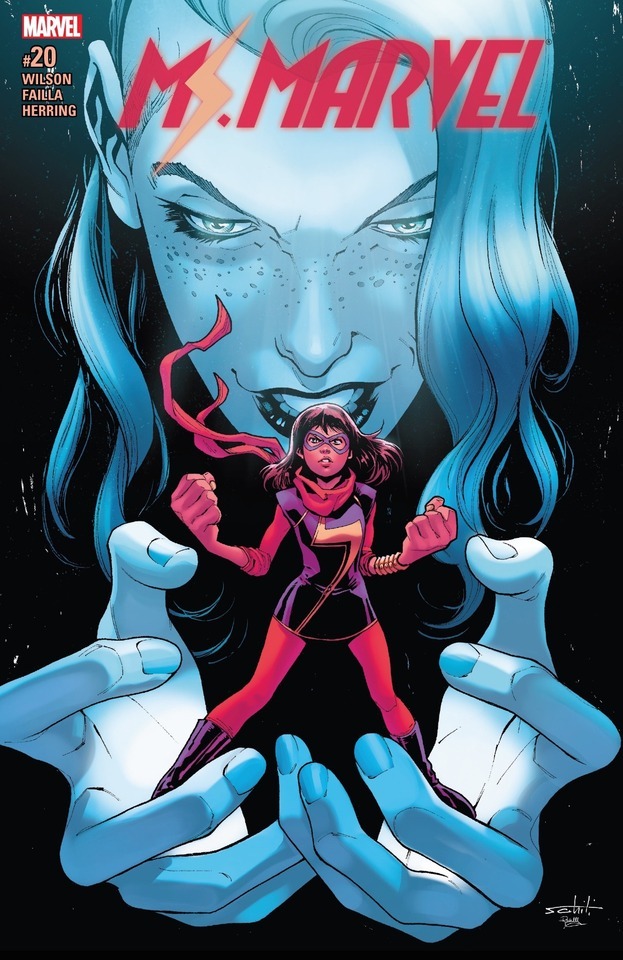
Ms. Marvel #20 Review
spoilers spoilers spoilers spoilers spoilers spoilers spoilers spoilers spoilers
It’s the second installment of the timely and topical ‘mecca’ story-arc, from the creative team of G. Willow Wilson, Marco Falla and Ian Herring. Full recap and review following the jump.
Last issue saw the mayorship and governance of Jersey City taken over by sinister forces, including Dr. Faustus’ former underling, Chuck Worthy, and his chief lieutenants, Lockup and Discord. As Ms. Marvel, Kamala charged in headlong and unfortunately fell to the electrical powers of the mysterious villain, Discord (there’s something eerily familiar about this guy).
Meanwhile, the Worthy’s administration has instituted a zero tolerance policy against anyone with super human powers or abnormalities (a thinly veiled metaphorical stand-in for ultra-jingoistic white nationalism). Kamala’s brother has been apprehended by Worthy’s goons, charged with having possessed super powers and not divulging his status to the authorities. Aamir had only possessed such powers for a brief time following his exposure to a mysterious quasi-terrigenic gas by Ms. Marvel’s foe, Kamran. These powers quickly wore off, but the mere fact that Aamir once possess powers is enough for the Worthy administration to identify him as a threat to public safety who should have his U.S. citizenship revoked and subsequently deported back to his birth country of Pakistan.
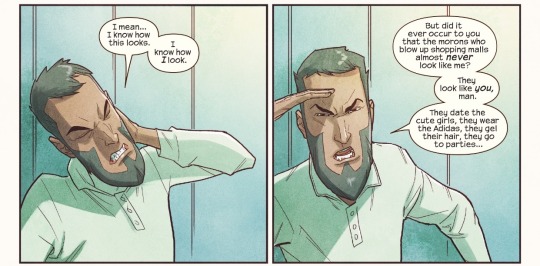
The issue begins with a harrowing scene where the detained Aamir is interrogated. Aamir doesn’t quite understand the situation and he assumes that he has been arrested by the NSA or FBI. He imagines that he has been detained under the assumption that he is an enemy combatant, an Islamic extremist plotting acts of terror against the United States.
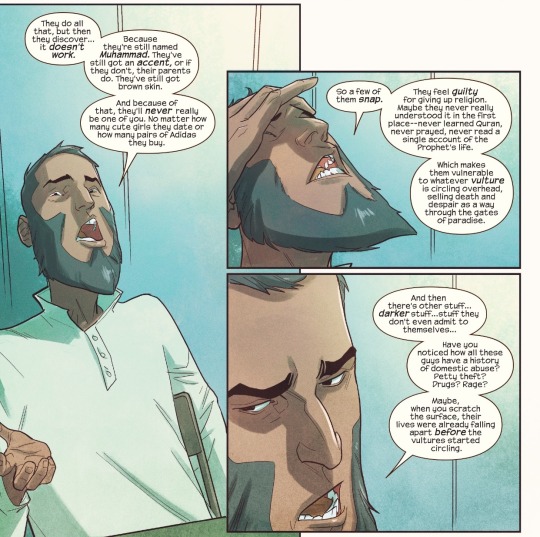
In expounding on his innocence, Aamir delivers an extremely interesting speech about the types of people do and do not fall in with such extremism. What he says is poignant, not devoid of compassion and, above all else is strikes me as absolutely correct.
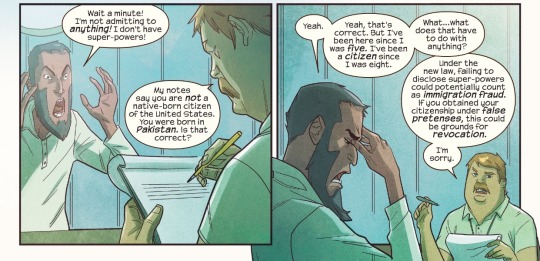
And yet Aamir has not been arrested for suspected terrorist ties, his charge is that he possessed super powers and failed to register this with the city municipal government. Befuddled, Aamir states that he only possessed these powers for a brief moment before they wore off; a statement that his interrogator interprets as an admission of guilt. In a knife-twisting extra punchline the interrogator also notes that Aamir was seen walking down the street carrying a pressure cooker (it was actually a slow cooker containing left overs that Aamire was bringing to his neighbors).

All the while, Aamir’s interrogation is being watched in an adjacent room by Lockdown and Dischord. The interrogator excuses himself to speak with these two, He states that Aamir is a small fish, no real threat and suggests they cut him loose. Discord disagrees, he wants Aamir further detained. Discord is ardent and zealous in his crusade to rid Jersey City of all of the freaks and super powered beings that has robbed the city of its normalcy. The juxtaposition between Discord’s extremist zeal and what Aamir had said about what can lead one to becoming terrorists is rather overt, but a satisfying parallel.

Elsewhere, Ms. Marvel is waking up from being knocked unconscious in her battle with Discord. Although bested, Discord chose not to detain her and left her where she was. In the twilight of her regaining consciousness, Kamala hallucinates that her old friend Bruno is at her side. The visage of Bruno voices a bit of exposition, noting that Kamala has a tough fight on her hands and is going to have to come to terms with the fact that not everyone is going to like her. The world is not black and white, all good or all bad. What is right and what is wrong is colored by opinion and she has to wake up to the fact that she will never be universally accepted for who she is.

Ms. Marvel shakes off the cobwebs and darts back to the heart of the city where she quickly comes across a political rally held by the new Mayor Chuck Worthy. Worthy is whipping up the crowd with his promises of bringing back peace and economic prosperity by ridding the city of all of the costumed freaks and super powered beings.
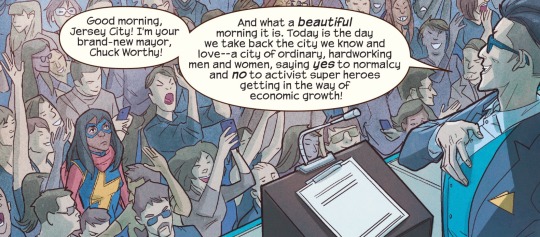
It’s all a rather straightforward straw man argument wherein a minority population is identified and vilified, held responsible for all the woes that trouble a politician’s constituents. It’s also a rather obvious analog to the type of fear mongering that the Trump administration utilized to win the American presidency. Any doubt of this is wiped away when Worthy notes that the rumors of his affiliation with Hydra is merely alternative facts propagated by the fake news media.
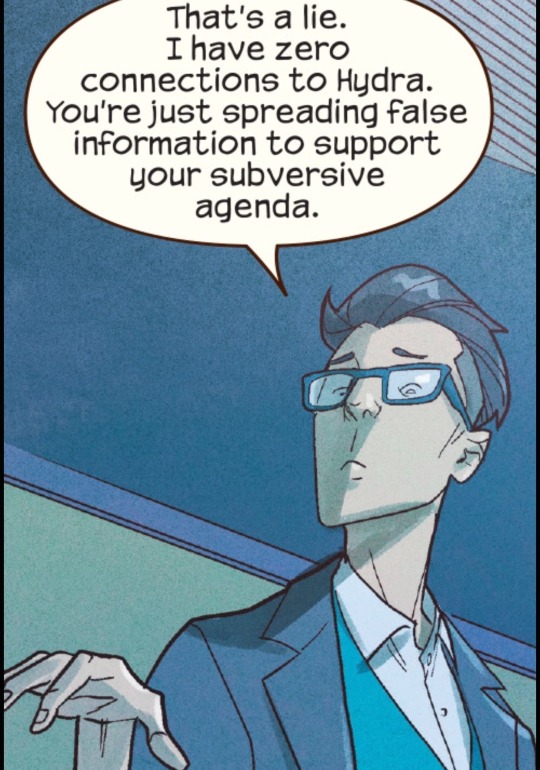
Worthy has spotted Ms. Marvel among the crowd. His goons, Lockdown and Discord attack. A tremendous battle ensues and Ms. Marvel is forced to flee when Discord unleashes a mobil missile platform that fires off a bevy of explosive projectiles.
The narrative switches to the now abandoned offices of the former mayor, Stella Machesi. The liberal minded wheelchair bound Machesi was elected mayor several issues back in a one-shot tale where Ms. Marvel and her allies were able to battle through the barriers of district gerrymandering and get out enough of the vote to defeat Chuck Worthy’s dastardly plans to win the election. It was an idealistic story that as quite clearly written and illustrated before the November election that saw Trump earn the presidency by way of the electoral college despite losing the popular vote by a sizable margin. And it would seem that Worthy has stolen the Mayorship by way of similar Byzantine back door politics.
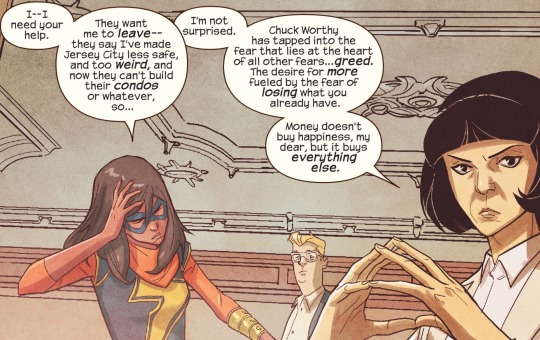
Ms. Marvel, roughed up by her fight with Discord arrives at Machesi’s offices asking for her help. Machesi has little to offer in the way of aide. She notes that Worthy has seize power by tapping into the populace’s more baser instincts: their fear and greed. Before the two can formulate a plan, they are interrupted by Discord who calls out for Ms. Marvel from the street below. Discord demands Ms. Marvel’s surrender and has paraded out a group of his detainees so to motivate her giving herself up peacefully. The individuals Discord had detained appear to be innocents, people who have been arrested simply because they are different, because they are Inhumans or Mutants and their physical appearance is deemed by the status quo as being abnormal. They haven’t done anything wrong, but Discord and Lockdown have been given the authority to apprehend them nonetheless and Discord notes how easy it could be to misplace paperwork and keep them imprisoned without charge trial all but indefinitely.
Once more, Kamala cannot help to feel that there is something distinctively familiar about Discord. He knows how to press her buttons almost too well. It’s almost like he is a former friend who had gotten to know Kamala and now uses that intimate knowledge as a weapon.
As a final threat, Discord brings out Aamir who has also been detained without charge. Discord aims his power gauntlet at Aamir, threatening to kill him. Amir has been identified as an abnormal, something less than human and Discord could kill him with impunity… unless Ms. Marvel agrees to surrender.

And it is with this frightening cliffhanger that the issue ends with the promise of continuation.
Wow. This issue pulls absolutely zero punches.
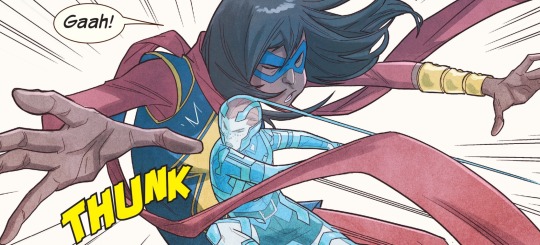
After the preview pages for this issue was released last week, I received a question from a fellow fan bemoaning the fact that Wilson and company was producing such a politically charged story in the pages of Ms. Marvel. While I can understand the wish that comic books might remain pure escapism devoid of politics and social issues, I don’t blame Wilson for making the decision to go in the other direction. Indeed it could be construed as irresponsible were she not to address these issues.
Ms. Marvel is the first Muslim-American character to headline a mainstream superhero comic. Her religion and ethnicity is not her only character trait, but it is a facet of who she is; and to that extent it would be something of a dereliction of duty to sidestep the harsh realities that Muslim Americans have to contend with in real life. People who are Muslim, people who may look as though their family lineage might herald from the Middle East, India or Pakistan are forced to live under the looming threat of being misidentified as enemy combatants, potential terrorists… some sort of threat to Western society. They live with the fear that they could be disappeared by the government, detained and held indefinitely without trial or legal representation. This is not just a plot point for the issue, this actually happens in real life.
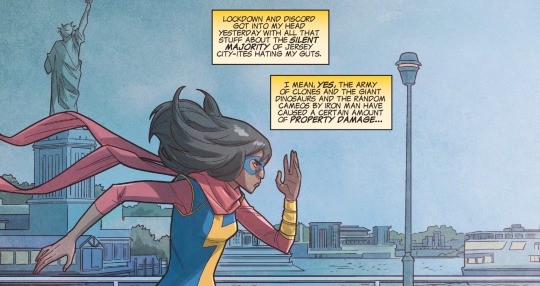
There’s an interesting parallel process to Ms. Marvel’s sense of popularity both in the fictional world of the Marvel Universe and actual reality. Ms. Marvel arrived with a splash and was an immediate darling of liberal minded comic fans. It was cool that there should finally be a big name Muslim super hero, but it was the great quality of the writing and art that really made the comic a hit. Kamala is such a well-rounded and fully developed character; she’s fun and relatable, lovable. And yet times have changed and the shift in the political atmosphere has emboldened those with bigoted, intolerant views to be much more open and vocal in their feelings. Quite suddenly there were comic book fans who were vocal and upfront over their dislike of the surge in liberal, multicultural characters in superhero comics. Suddenly there were people out there expounding their hatred of Ms. Marvel, a hatred based on her being a girl, of her being Muslim, of her being the darling of the so-called liberal elite. All this was likely quite jarring for Ms. Wilson and the other creators working on Ms. Marvel. And to the same extent that Marvel itself has had to contend with the fact that not everyone likes Ms. Marvel, Kamala herself has had to cope with this matter.

Ultra-conservatives and Trump supporters are likely to be a touch alienated by this issue, by seeing the sinister Chuck Worthy as such a poorly disguised representation of the so-called Alt-Right. Yet, the chances that people with such views are actually reading Ms. Marvel is likely pretty slim. So screw’em…
The politically charged nature of the story might not be for everyone. Some may prefer super hero tales that are a bit lighter, that avoid the unsettling truths of the real world. As for me, I like it and I completely understand Ms. Wilson’s desire to take on these matters. It helps that Kamala and I share political convictions. I definitely recommend this issue, but am aware that there may be some who find the heavy socio-political nature of the story to be disquieting. Three out of Five Lockjaws.

50 notes
·
View notes